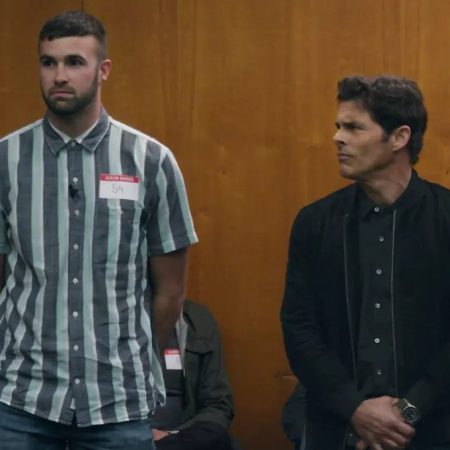Nathan Fielder has spent a little over a decade — first on Comedy Central’s Nathan For You, then on HBO’s The Rehearsal and now on Showtime’s The Curse — reminding us not to take what we see on TV at face value. Instead of pulling the rug out from under us, the comedian loves to make his points by adding layers and layers of artifice, whether it’s in “The Anecdote,” the 2017 episode of Nathan For You where he revealed that a wild story he told on Jimmy Kimmel months prior was actually a total fabrication, or on The Rehearsal, where his increasingly elaborate set pieces and collection of actors-playing-actors-playing-real-people begged us to question our own reality and wonder just how much the unsuspecting participants who thought they were signing up to appear on a reality show knew about what was going on. (Thanks to some strict NDAs, we may never know.)
He’s an intentionally unreliable narrator, guiding us through a hall of mirrors in the hopes that we’ll eventually come to realize that the reality shows he’s satirizing are just as meticulously crafted by teams of producers as his goofy stunts are. Fielder knows how the sausage is made; he got his start working as a writer and segment producer for Canadian Idol. Perhaps that’s why he’s so adept at poking holes in the genre. He knows how to manipulate an audience, and he uses that skill to goad them into pondering important questions like “is reality TV exploitative?” (yes), “is it ethically dubious to exploit someone on TV in order to make a point about how they’re being exploited?” (yeah, maybe) and “does Nathan Fielder really have a micropenis, or was that a prosthetic?” (more on that later).
Like his previous work, The Curse is a send-up of reality TV — this time, it’s the world of home renovation shows. But this time around, Fielder isn’t playing himself. He and Emma Stone play Asher and Whitney Siegel, a married couple filming a pilot for an HGTV show called Flipanthropy. Benny Safdie (who co-wrote the series with Fielder) plays Dougie, their trashy producer who keeps trying to spice up their dull series by sowing discord between them, and The Curse opens with him rubbing menthol in the eyes of a cancer patient being interviewed on-camera by the Siegels to make it look like she’s crying. Theoretically, we should know exactly what we’re in for from the jump; this is a fully scripted series about bad people doing bad things in the name of good TV.
And yet, there’s still plenty to question here. The show establishes early on that Asher and Whitney are attempting to paint themselves as white saviors building eco-friendly passive homes in the mostly working-class, Latino and Indigenous community of Española, New Mexico and offsetting the gentrification that their fancy, energy efficient homes usher in by setting up the people they’re displacing with jobs in the coffee shop they also own. Of course, this is all for show — their real motivation is to drive up the value of their various properties in town, and the coffee shop is only open when cameras are rolling. When a local news anchor starts asking hard questions about Whitney’s slumlord parents, Asher snaps at her on camera, setting off a series of events that build to the The Curse‘s main plot point: He meets up with the reporter to beg her not to run the interview, offering her a scoop about gambling regulations at the Indigenous-owned casino where he used to work in exchange for her discretion. While he’s waiting for her, Dougie convinces him to go give some money to a young girl selling loose cans of Sprite on the street so they can use it as a feel-good moment on the show; Asher only has a $100 bill in his wallet, so he gives it to the girl while the cameras are rolling but snatches it back from her once they’ve got the shot. Naturally, she’s furious, and she looks him dead the eyes and says, “I curse you.”
That curse drives a wedge between Whitney and Asher when the former finds out about it, though the show leaves it delightfully ambiguous as to why Whitney’s so scared of it — is it because she’s subconsciously racist enough to think that this young Black girl knows voodoo or actually has some sort of magical powers, or does she just hate the idea of anyone thinking ill of her? Is believing you’re cursed just as bad as actually being cursed because you’re constantly waiting for the other shoe to drop as you scramble to attribute every minor inconvenience or mundane mishap in your life to some hypothetical witchcraft? Meanwhile, the show goes out of its way to reveal that, in a way, Asher’s been dealing with a curse of his own this whole time. (I told you we’d eventually get back to that micropenis!) A full-frontal shot of him peeing reveals that he has an abnormally small dick; it’s heavily implied that Whitney has been talking to her parents about this, and then, in arguably the most intentionally cringy scene you’ll ever see on television, her father later takes Asher out to the garden, where he tells him to embrace the humor in his tiny dong and stop being insecure before whipping out his own, even smaller micropenis. The specifics of this conversation are too much to get into here, but just know that you won’t be able to shake the term “cherry tomato boys” from your psyche any time soon.
Are Shows Like Nathan Fielder’s “The Rehearsal” Exploitative?
One man’s appearance on the show has sparked debate on social mediaThe tiny penises are jarring. (There are entirely separate articles to be written about whether or not it’s problematic to use the size of a character’s genitalia as a sort of shorthand explanation for why they’re an insecure jerk. I’m sure there are plenty of men out there with smaller-than-average junk who are perfectly lovely people.) They’re unexpected, and they’re meant to make us uncomfortable — just like the note-perfect trailer for Love to the Third Degree, Dougie’s failed reality show pilot where a group of women vie for the affection of a masked man. They think the mask is obscuring his identity — could he be a famous celeb? — but it’s eventually revealed that he’s a burn victim whose face has been disfigured in a house fire. It’s a spot-on parody of the kind of trash you’d find on Netflix (it’s really only one, er, degree away from the general conceit of Love Is Blind), and of course it also makes you want to die of second-hand embarrassment.
The true genius of The Curse is the way it’s able to make us pause and question what the hell it is we’re actually watching. Is it a dark comedy, or a harrowing drama that happens to have some funny moments? Fielder and Safdie do an excellent job of making the audience feel like they’re actually watching a horror movie, utilizing an eerie, synth-heavy score to make awkward interactions feel even more unsettling and filming their main characters in a way that makes it feel as though they’re constantly being watched. They’re shot through peepholes, reflected in mirrors across the room or caught on camera from the other side of the street; anyone who’s ever seen a Halloween movie knows that these point-of-view shots are meant to establish that our victims are being stalked by some sort of Big Bad. This time, however, there’s no Michael Myers-style slasher or supernatural being hunting Asher and Whitney on The Curse — there’s just us, taking it all in as we sit in the uncomfortable truth Fielder has once again led us to, that maybe we’re the monsters for watching in the first place.
New episodes of The Curse stream on Paramount+ on Fridays and subsequently air on Showtime on Sundays at 10 p.m. EST.
This article was featured in the InsideHook newsletter. Sign up now.

























